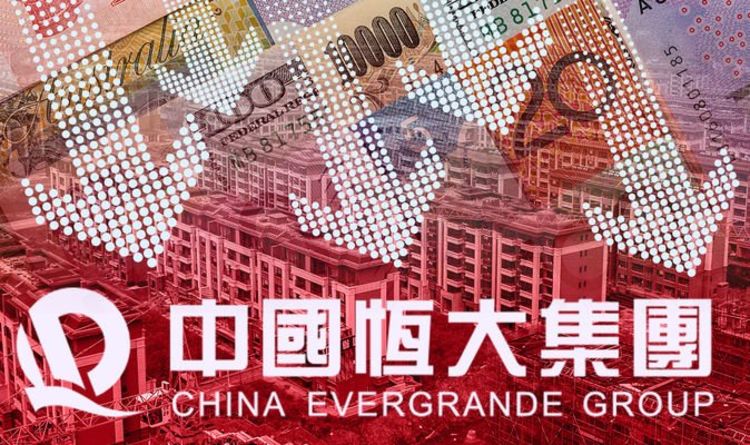Biden says US would come to Taiwan’s defence if China invaded
We use your sign-up to provide content in ways you’ve consented to and to improve our understanding of you. This may include adverts from us and 3rd parties based on our understanding. You can unsubscribe at any time. More info
The Chinese firm, Evergrande, has accumulated debt of approximately $305billion (£221billion) and may severely damage the state’s economic growth if it cannot repay the money. The property giant is the second-biggest in China and its liabilities account for two percent of China’s total GDP. After the Chinese government introduced restrictions on how much companies could borrow, Evergrande has struggled to pay off its debt repayments thus putting it on the brink of collapse.
Although the Evergrande Group managed to pay $83.5million (£60million) in a bond interest payment on Friday, the company missed a separate deadline on September 23 and two other payments on September 29 and October 11 worth up to $193million (£140million).
Deals to sell off its property arm and Hong Kong headquarters have also fallen through, which has sparked panic across China.
Commenting on the debt repayment on Friday, Jeffrey Halley, senior market analyst at Oanda in Singapore said it has done little to assuage fears over the overall economic picture for China.
He said: “I think this will be a short-term positive but I don’t think this will change the overarching fears about what the true state of the sector or the China economy is at the moment.”


Indeed, the company’s real estate arms stretches across the country and builds approximately 600,000 homes a year, the BBC reports.
Due to the financial difficulties, Bloomberg reports real estate sales plunged about 97 percent during peak home-buying season for the company.
The company even announced in a statement that it may struggle under the huge financial obligations it has to make.
A statement read: “In view of the difficulties, challenges and uncertainties in improving its liquidity, there is no guarantee that the group will be able to meet its financial obligations under the relevant financing documents and other contracts.”
JUST IN: Brexit LIVE: UK makes up for Commonwealth betrayal

With China integral in producing goods, a valuable trade route while also being the second-largest economy in the world, economists fear the ramifications of the company being unable to repay their debt across the globe.
As an example of China’s global importance, due to the pandemic, shipping costs from China to Northern Europe have gone up by 859 percent from last year, according to Freightos.
This has sparked supply chain issues across Europe, while the cost of shipping from China to the North American coast has increased by 1,250 percent due to the disruption the pandemic has caused.
Economists fear shorts on debt repayments as Evergrande owes money to over 100 domestic banks and multiple financial firms.
DON’T MISS
Dad ordered to repay all Universal Credit he received during COVID-19 [Latest]
One in four Brits earn an extra £530 a month – thanks to second job [Update]
Man, 64, explains how he’s boosting retirement income [Insight]


If such a large company failed to repay its payments, other banks around the world would begin to lend less and lose confidence in the global system.
It has drawn parallels to 2008, when Lehman Brothers filed for bankruptcy and sparked a global financial crisis.
The banking system almost collapsed after many citizens in the US could not afford to repay their mortgages thus causing a credit crunch – whereby companies struggle to borrow due to banks and other lenders having low confidence in the system.
If a credit crunch occurs, global investors may become concerned with the economic situation in such a large economic powerhouse.

They indeed may question which other companies may also fail to repay debt payments on time and in full in other emerging or more developed economies.

Mattie Bekink from the economic intelligence unit told the BBC: “What happens from here is consequential not only to the Chinese economy, where there are concerns about liquidity pressures and stress in the property and interbank markets but for the global economy.”
Source: Read Full Article
